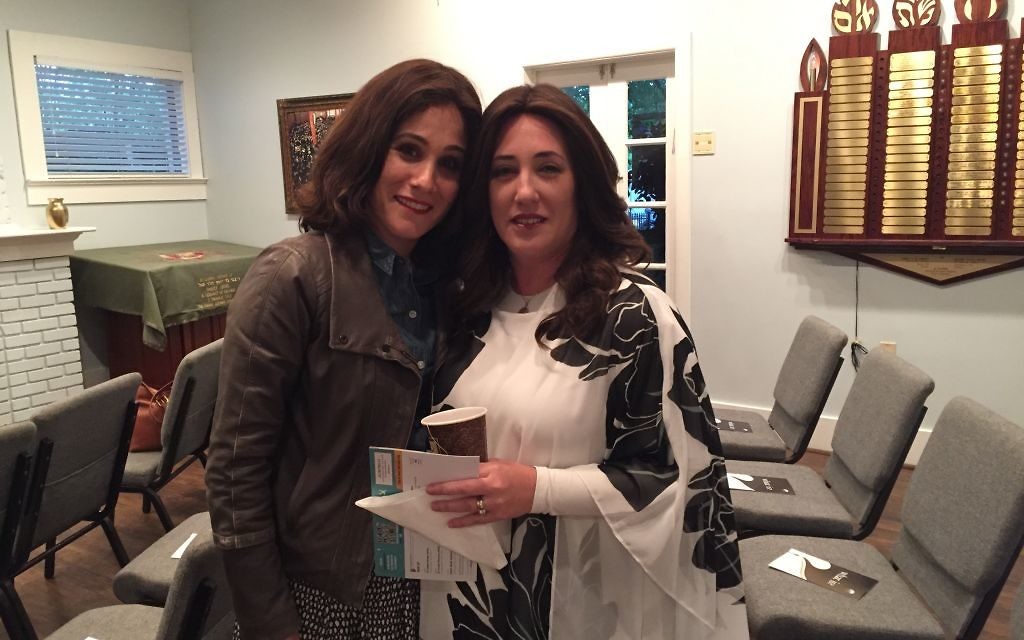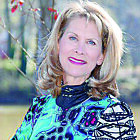Rabbi’s ALS Leads Rebbetzin to Laugh, Cry, Inspire
Dina Hurwitz tells her story at Intown Jewish Academy.

How many times each day do we remind our healthy selves to express gratitude? Are we confident we would have the inner strength to deal with long-lasting terrible news?
Dina Hurwitz, a Chabad rebbetzin from California whose husband, Yitzy, is battling ALS, delved into those questions with her presentation on “Sharing Light From the Silver Lining” on Tuesday night, April 24, at Intown Jewish Academy.
Most of us unfortunately are familiar with ALS, also known as Lou Gehrig’s disease, a degenerative nerve disorder that has a poor prognosis for quality and length of life.
Get The AJT Newsletter by email and never miss our top stories Free Sign Up
How much more tragic when it strikes a gracious, happy man in the prime of life who is rearing young children. Wife Dina walked us through the steps of his diagnosis and decline and how she deals with life.
Rabbi Yitzy was known for his singing, warmth and energy as the Chabad rabbi in Temecula, Calif., when he began having tongue symptoms in 2012. One of his side jobs was supervising kosher milk on a farm, and Dina recalls catching him playing “Old MacDonald Had a Farm” to the cows.
“That’s how he was — relishing each job, even the roughness of being the chaplain in a state mental facility,” she said with a laugh. “That was probably good for our marriage when we saw how normal our own families are.”
The diagnosis and decline came rapidly in 2013, from laughing uncontrollably to losing his ability to daven and sing, moving from wheelchair to electric wheelchair and using his eyes to type as his only form of communication.
But he still was an “optimipotamus,” Dina said, cheering others up, writing a blog, welcoming throngs of visitors.
Dina’s directives for herself included being honest with the children at their level (then deal with them Googling the disease), delineating between the pain everyone feels and actual suffering, and not beating herself up if the kitchen was not so clean.
“Deciding to be happy is like deciding to lose weight,” she said. “Nothing happens until you do something. Embrace being silly. Tell your kids yes for things that can make them happy. I gave myself permission to be scared.”
She continues to laugh at Yitzy’s humor, such as saying, “You kvetch so nicely,” or changing his computerized voice to a Scottish brogue, making him sound like a “drunk rabbi.”
The community support, especially within Chabad, is invaluable. The family moved into an apartment in Los Angeles next to a yeshiva, and the boys come over to help with his care (in addition to a nurse).
People bring meals and help with carpool. The chief of police showed up at the door for a visit. The Hurwitzes can get 100 visitors a week, from musicians to the chief rabbi of Israel.
The evening at Chabad Intown ended with a video of Yitzy from his bed, mixed with dozens of scenes of Jewish musicians singing from various venues about shining his light.
“Learn from the mistakes of others,” Dina concluded. “You will never live long enough to make them all yourself. Try new things. I have a fear of public speaking, and look at me now.”
Rabbi Ari Sollish said: “She is an incredibly strong person who radiates love, faith and gratitude. We laughed, we cried, and we were uplifted.”
Robin King, a member of Chabad of Cobb, urged others to support and donate to ALS causes and to buy tickets for the Muscular Dystrophy Association’s Night of Hope gala (www.mdanightofhope.org) to raise money for ALS research Oct. 19 at the InterContinental Buckhead Atlanta.
Donations to help the Hurwitz family can be made at www.Hurwitzfamilyfund.com.




comments